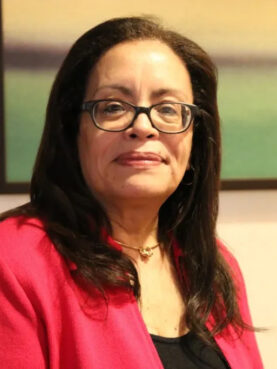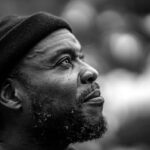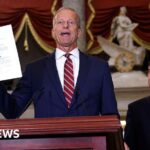VATICAN CITY (RNS) — Rosa Bonilla knows firsthand the fear and anxiety that has gripped the Latino community in the United States amid Trump’s deportation policies and ICE raids.
Originally from El Salvador, Bonilla serves in the Dolores Mission Church in Los Angeles, a Jesuit parish known for its outreach to migrants, especially from Mexico and Central America. She accompanies families through grief and celebrations, helps them find housing, employment and health care. She is there when they need food, or they get sick. She also puts people in touch with pro-bono lawyers when necessary.
“People are really scared to go out — even those with papers,” Bonilla said. She said that Mass attendance has dropped in some cases, while parish staff adapts to best serve the community. She told of a woman who hadn’t yet buried her deceased 23-year-old daughter, worried that if she was deported she would not be able to visit her daughter’s grave. Bonilla and the community gathered around the woman, eventually convincing her to cremate the remains of her daughter so they could never be separated.
These stories are why Bonilla came to Rome for the Vatican’s Jubilees of the Missions and of Migrants, which took place Oct. 2-5. As she walked through the Holy Door of St. Peter’s Basilica, where Catholics pray to obtain absolution from their sins during the Jubilee year, Bonilla said she would be “praying for people to find the hope to continue walking in these hard times,” with hopes that they would be reminded that they are not alone.

Elisabeth Román. (Photo courtesy of NCCHM)
Bonilla was among 100 people, including bishops, pastors and families from 60 dioceses in the U.S., who came to Rome for the Jubilee with the National Catholic Council for Hispanic Ministry, or NCCHM, which brings together Catholic institutions working in Hispanic and Latino communities in the United States. While the organization acts independently, it operates under the aegis of the U.S. Conference of Catholic Bishops.
Elisabeth Román, who has been leading NCCHM for 11 years, said that many Latino Catholics in the U.S. feel abandoned and alone. “We came to the heart of the Catholic Church, as Christians, to kind of be seen,” Román said, “There is this wound in us … we don’t see anyone defending us. We don’t see anyone speaking about the persecution.”
Román described a climate of fear, where even the Catholic Church, which lost federal funding for its charitable work, is too afraid to speak up. Parishes have reinstated pandemic-era dispensations for attending Mass so that those who fear arrest may stay home, and Román pointed out that even Catholic leadership classes have been moved online. “Everyone’s afraid to speak, but we cannot, because of fear, not say things,” she said.
According to Pew data from 2025, Hispanic Catholics comprise 36% of all Catholics in the United States, and their numbers are growing. In addition, between 50% and 60% of Catholics under 18 are Hispanic. “We wouldn’t have a Catholic Church in the U.S. if we didn’t have Latinos,” Román said, adding her hope “that the church can speak for us because we’re being trampled in the U.S.”
Despite NCCHM’s attempts, the group was not able to have a private meeting with Pope Leo XIV, but its pilgrims were present at the Mass in St. Peter’s Square that closed the Jubilee on Sunday (Oct. 5). In his remarks, Leo called on migrants and missionaries to have hope in the face of evil and injustice, even when it seems that God is silent before the pain and suffering of the innocent.
“Brothers and sisters, those boats which hope to catch sight of a safe port, and those eyes filled with anguish and hope seeking to reach the shore, cannot and must not find the coldness of indifference or the stigma of discrimination!” the pope said.
Leo stressed that the mission of the church is to be present in the lives of those who are forced to leave their homeland as a “presence of consolation and hope.” He praised missionaries, Catholic and non-Catholics, “who work in the service of migrants, and promote a new culture of fraternity on the theme of migration, beyond stereotypes and prejudices.”
Leo stressed that in the West, the presence of faithful from the Global South should “be welcomed as an opportunity” that can build a church that is “more alive and more dynamic.”
He concluded, “To migrants I say: know that you are always welcome!”
The pope has spoken about immigration before in his brief tenure. In July, in his message for the World Day for Migrants and Refugees, he described immigrants as “messengers of hope,” and while talking with journalists on Sept. 30, he criticized the “inhuman treatment of immigrants in the United States,” questioning whether such treatment could be considered pro-life.
Bonilla, who said she loves hearing Leo speak in Spanish, hopes he will continue to show support for immigrant families and “building bridges between our communities.”
Talking about immigration, however, means at least implicitly engaging with U.S. politics, which the Chicago-born pope may be more equipped but just as loathe to do as his predecessors. When journalists asked the newly elected Leo in May whether he had a message for the U.S., he answered with a one-word reply: “Many.”
Massimo Faggioli, a church historian and professor at the Loyola Institute at Trinity College in Dublin, Ireland, said conservative and progressive camps in the U.S. church have tried to claim the pontiff as their own, but that Leo has adopted a tone that “is more measured, but not necessarily more moderate.”
In a private audience on Oct. 2 with 250 academics and other specialists on the challenges facing migrants and refugees run by the pope’s religious order, the Augustinians, Leo praised the work of the participants, according to Faggioli, who was in attendance.
The pope’s comments showed, Faggioli said, that, after taking his time since his enthronement to meet and listen with people at the Vatican and beyond, Leo “is starting to make some decisions.”



